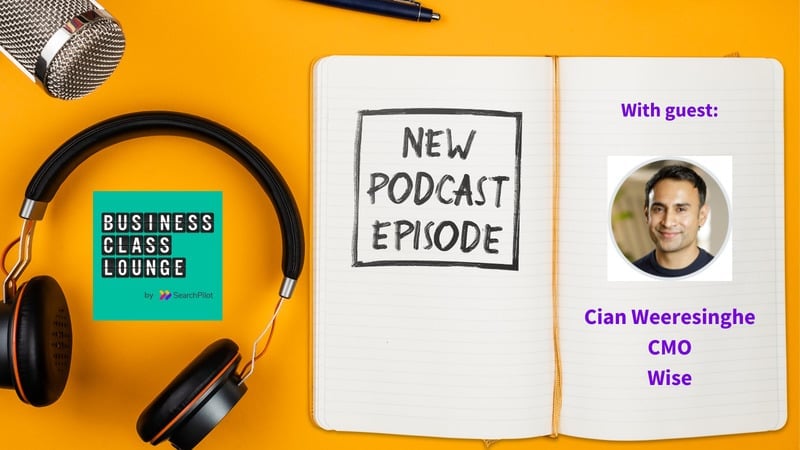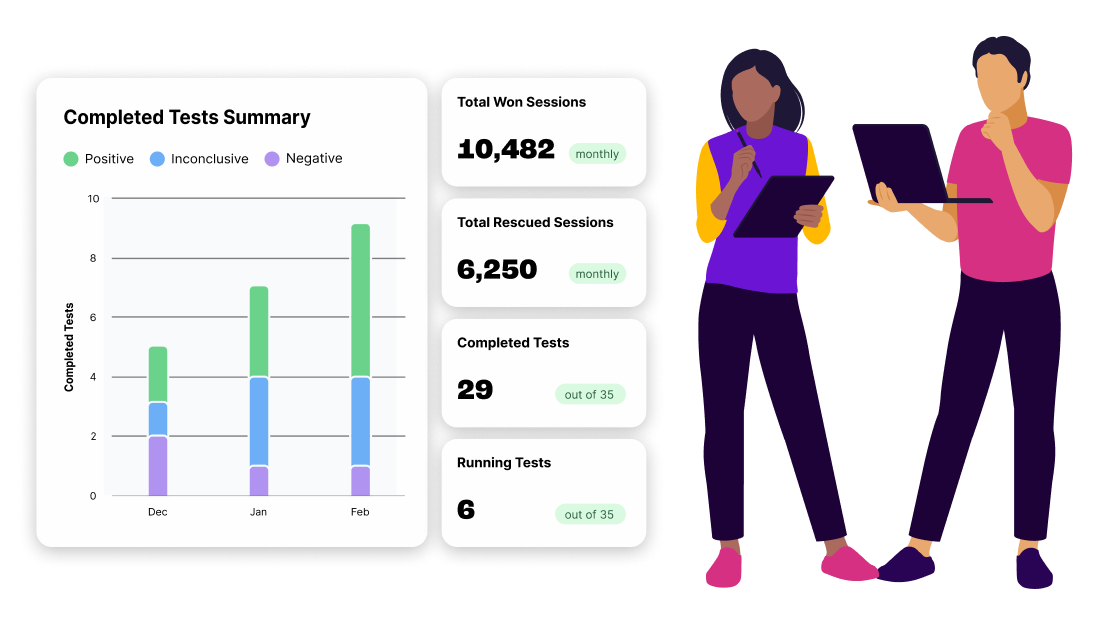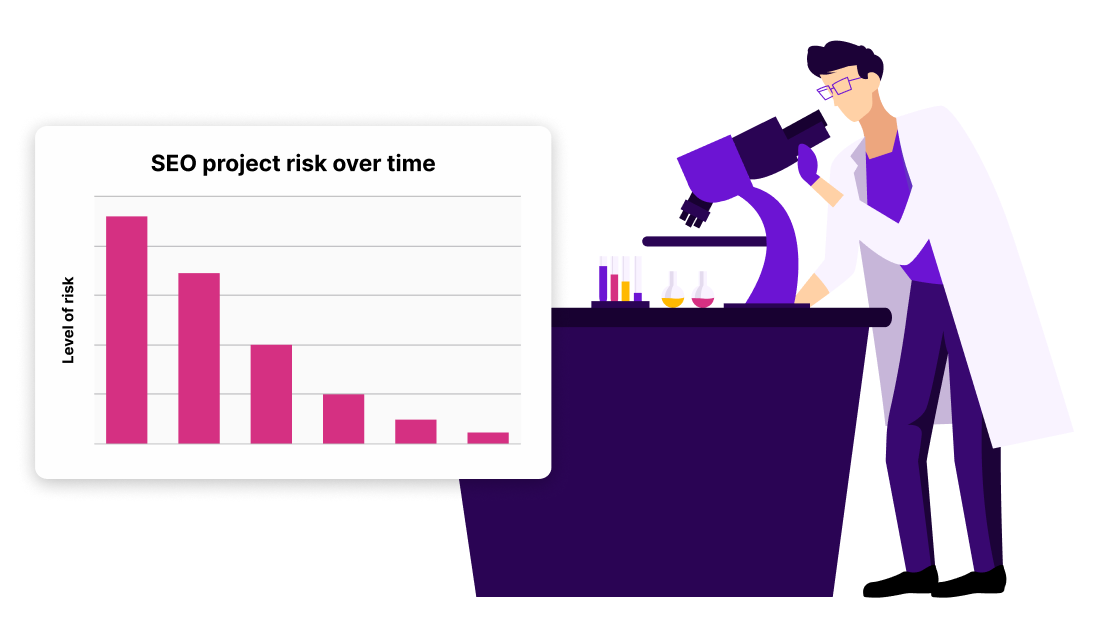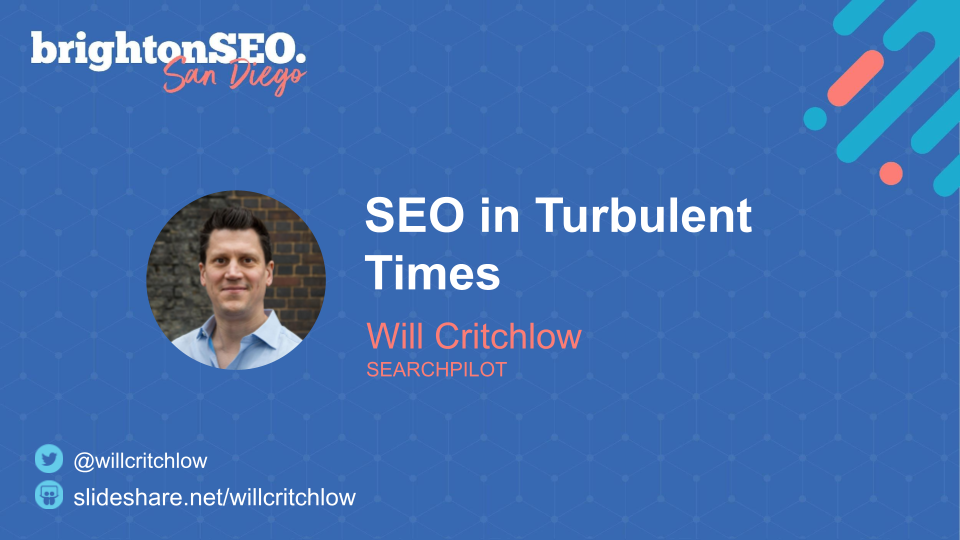In the 3rd episode of the Business Class Lounge, I talked to Cian Weeresinghe. I’ve actually known Cian since college, but it took us a little while to realize we’d both ended up in internet marketing.
He originally got into digital at eBay as one of a cohort of incredibly talented folks in the UK digital industry who are now scattered doing interesting things all around the UK startup scene. He ran growth at The Guardian following their massive domain migration in 2013, was CMO at a cool travel company named Secret Escapes and is now CMO at Wise, previously TransferWise. I guess he just can’t avoid being suckered in by big domain moves.
Below is the abridged transcript of the episode, where I want to share some of our discussions on leadership, SEO, and marketing, so you know what to expect from this episode. If you want to go straight to listening to the full episode now, you can catch it below or where you get your podcasts.
What do you feel like you can attribute your career success and career direction to? What are the big decisions you made and what do you look back on with joy?
Cian Weeresinghe (CW): When I look back, it’s the people I got to meet over time and maintaining those relationships over the long term. I started my career at Capital One, and 22 years later, I was joyfully discovering that Matt, who worked at Capital One in the same cohort, is now our CFO at Wise, and we had a lot in common.
I’m also quite proud that I’ve had 10 jobs and majority of them I got because I knew the person.
And that was just compounding networks over time.
And then I challenged myself to work at places where everyone was better than me and hopefully that would also help build those networks over time. The other thing was I, somewhere between accident and being deeply thoughtful, identified a few things that I wanted to get more experience of, which were adjacent to what I had learnt. I predicted I probably need to be better than rubbish and try to get that experience over my career. Whether it was through consulting, through doing slightly adjacent jobs or through just spending time within a role in domains I wasn’t hugely comfortable with.
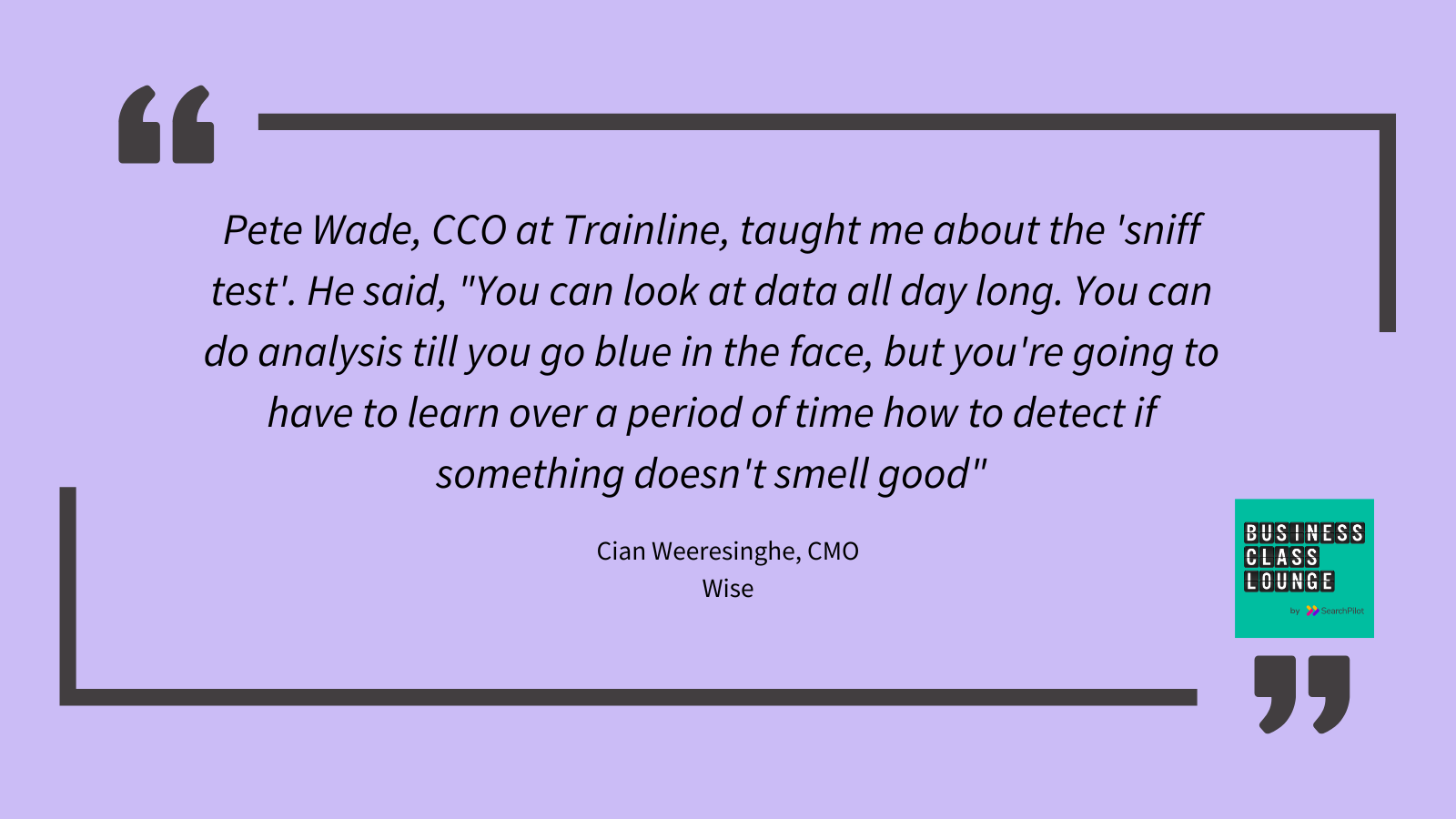
There’s a chap called Pete Wade, who’s CCO of Trainline now. Amazing guy. He was the one who taught me about the ‘sniff test’. He was like, “You can look at data all day long. You can do analysis till you go blue in the face, but you’re going to have to learn over a period of time how to detect if something doesn’t smell good”. I use this to challenge people’s assumptions. And I do try to explain to my team when they come up with something and I’ll be like, “But what do we need to believe in for this to be true?” And just check yourself when you work through your assumptions of these ranges because sometimes you’ll get to an assumption where you’re like, “This is gonna be really hard for this assumption to hold.”, if you just step back and smell it.
How do you think about professionalism as you get more senior in your career?
(CW): In eBay, we did this thing called situational leadership about how you adopt your style based on context. And I think that was very much about the context of delegation and managing someone depending on their capability and their motivation. But I think that style alteration, the deliberateness, is quite important to being able to understand the situation and land the right level of brevity to seriousness, as well as being able to judge reactions where you feel like you can start on one track and realize it’s not really the right place or time. And I think there is a credibility thing. You have to manage with the ability to be quite approachable. It’s a balancing act and I think you have to be getting feedback from your team on whether you are striking that right balance.
I think there’s a great benefit for everyone to have this camaraderie, which often is with levity and humor, but also have the seriousness of work that needs to get done or when shit hits the fan.
And I think you have to role model that seriousness when things are deeply important.
And then make sure you also, like in terms of norms, try to reset stuff you think where people haven’t really understood those boundaries.
Do you remember a time that you can talk about when, as you said, “the shit is hitting the fan” and you had to suddenly flip from, “I’m Cian, your boss, we get on, and we have fun but now we need to buckle up, and this is for real”?
CW: At Wise, we trust our team deeply and have this autonomous team structure. But there are moments where the moment requires you to take the handle of the tiller (gonna get my ship metaphors incorrect) and be incredibly clear and directive and make decisions yourself and navigate your way through, and people will look to you to do that and you can’t waver in those moments. And I think I’ve had to learn how to get better at that every time it’s happened.
Sometimes, there are things that happen over two days where you just need to navigate them. And I think as long as you’re very explicit, out loud, transparent, and confident. And you might not be confident internally but you’re gonna have to pick a play. You gotta portray it like that: “We’re doing this, this is the next thing we do. You guys should be thinking about this. We solve this bit of information, and then that’s the next thing we’ll do.”
Also that you don’t ignore people’s feedback even when you make that next decision. And I think the thing is just avoiding those sort of one-way doors as you go through that decision tree. And sometimes you have to work out how much you trust your ‘smell’ and how much you need advice and in those moments of crisis, not to be too arrogant to think you know best.
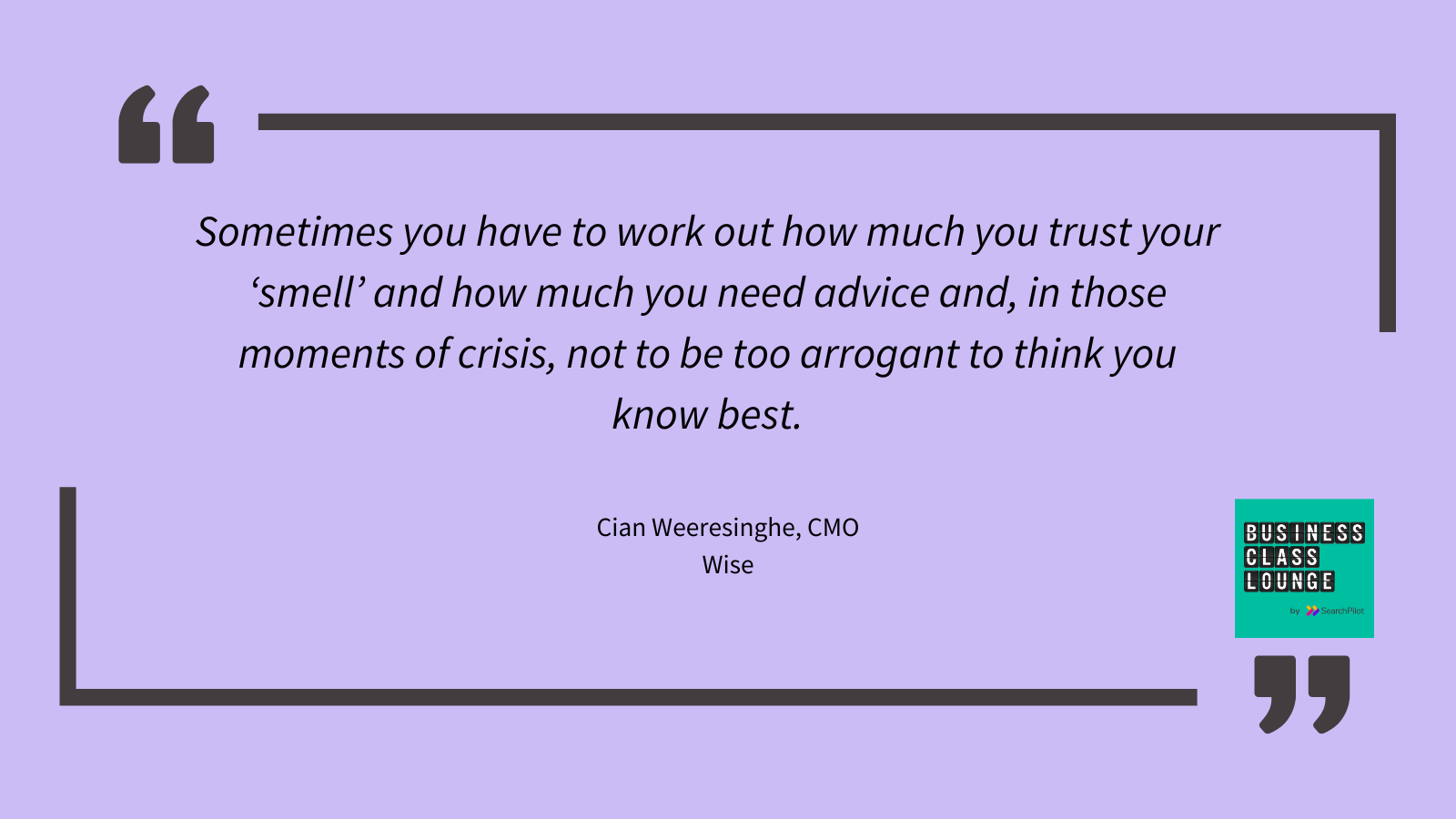
How do you think about holding your SEO team to account? What do you ask them to, report to you on, how do you think about targets?
CW: I was very blessed, you probably know Fabrizio, to have his leadership and capability in the organization when I joined. I obviously have an appreciation of the domain. I dabbled personally and helped with the domain migration at The Guardian. And what was impressive here, and I don’t think I’ve tinkered with it too much, is how the team have aligned the short and long-term KPIs of investing in SEO. How do you think about the actual investments, whether it’s people, freelancers, or tech, and then how do you start correlating that with growth, whether it’s at the midterm or longer term, and making sure the teams are as autonomously aligned to success themselves so that they know, “I’ve done this, it’s got better and I’m confident that this number gets better.”
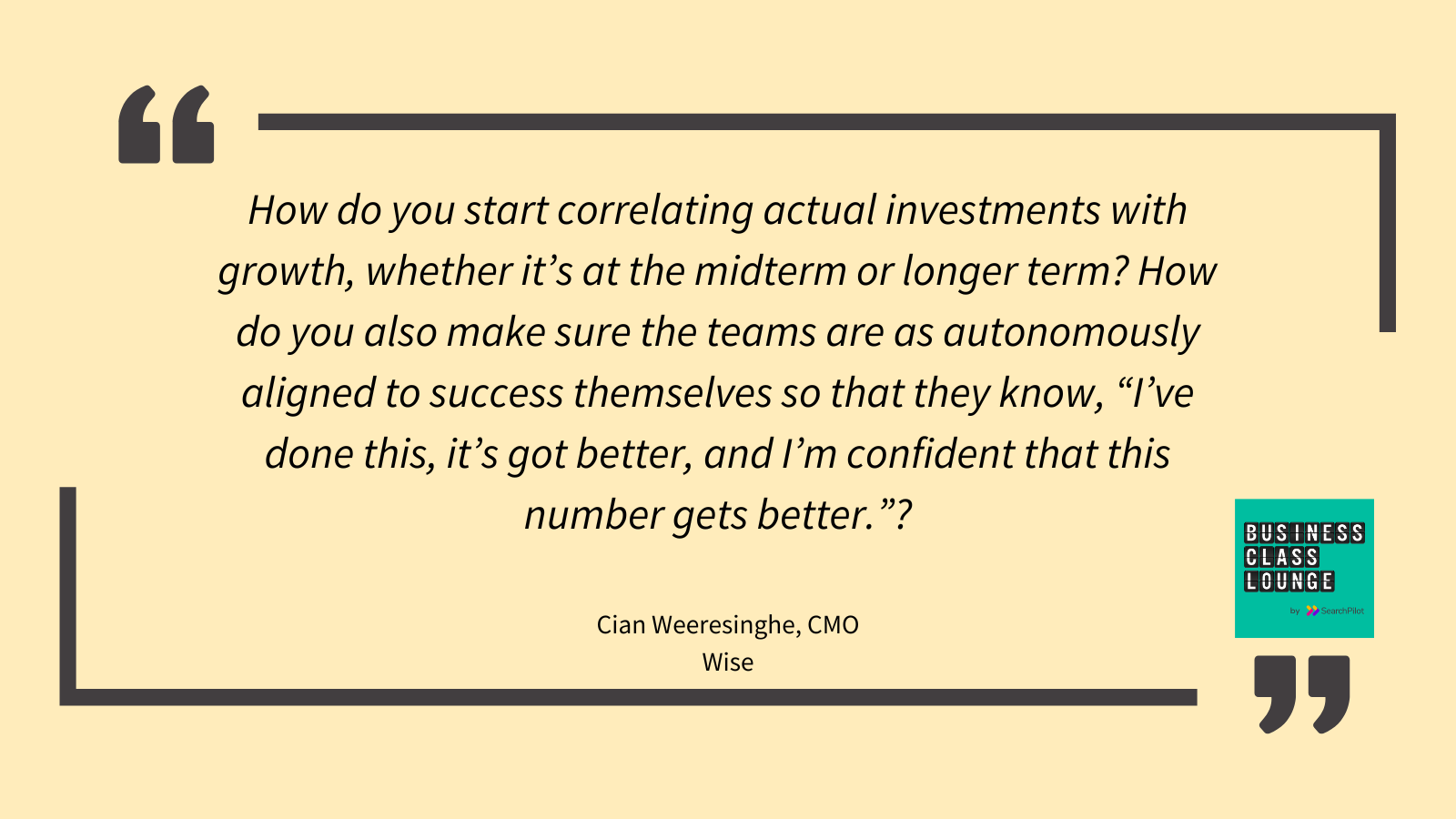
Teams aren’t too far removed from the North Star with their day-to-day metrics in terms of logical jumps. We give them broad investment parameters, which always need a bit of tweaking. That’s where I spend most of my time thinking about. But yeah, apart from that, they are, not free, but broadly allowed to decide how they want to grow.
I think accountability and autonomy are the sorts of things that have to [stay] close together.
The accountability side is that everyone has to share their plans publicly every quarter and get feedback on them and share your retros publicly, and you should respond to the feedback either “Cool, I’m ignoring you because of why.” or “Awesome. I’m gonna adjust my plan.” I think there’s a very strong philosophy around that side of the accountability equation for autonomy. So it’s a hard one because SEO, when we think about budgeting, you compare it like paid media on a spreadsheet - spend fully loaded versus impact. But it’s in itself, a cohort model where people build content and that content generates value over time. So the money I invest in SEO today is not really related to the amount of users I get from SEO today. And whereas paid is fairly closely aligned. Whereas things like product and engineering probably smell a bit more like SEO - and things like potential brand investment is a bit like that - where you have this lag.
The joy of SEO is that, because there’s no media component, your economics are much more interesting. The question there is, “How do you think about elasticity or scaling SEO when you don’t have that vertical view of impact versus investment?”
We do try to expose that asset value at a page level, so every team understands what they built, how much that page has generated, how the performance of that page improves or decays over time, should we build new content or try and optimize existing content? It’s that level of granularity and ability to track a metric to it wherever it is down the funnel where it’s useful. I think this gives us those levers to decide where to spend the next hour or time or dollar of investment.
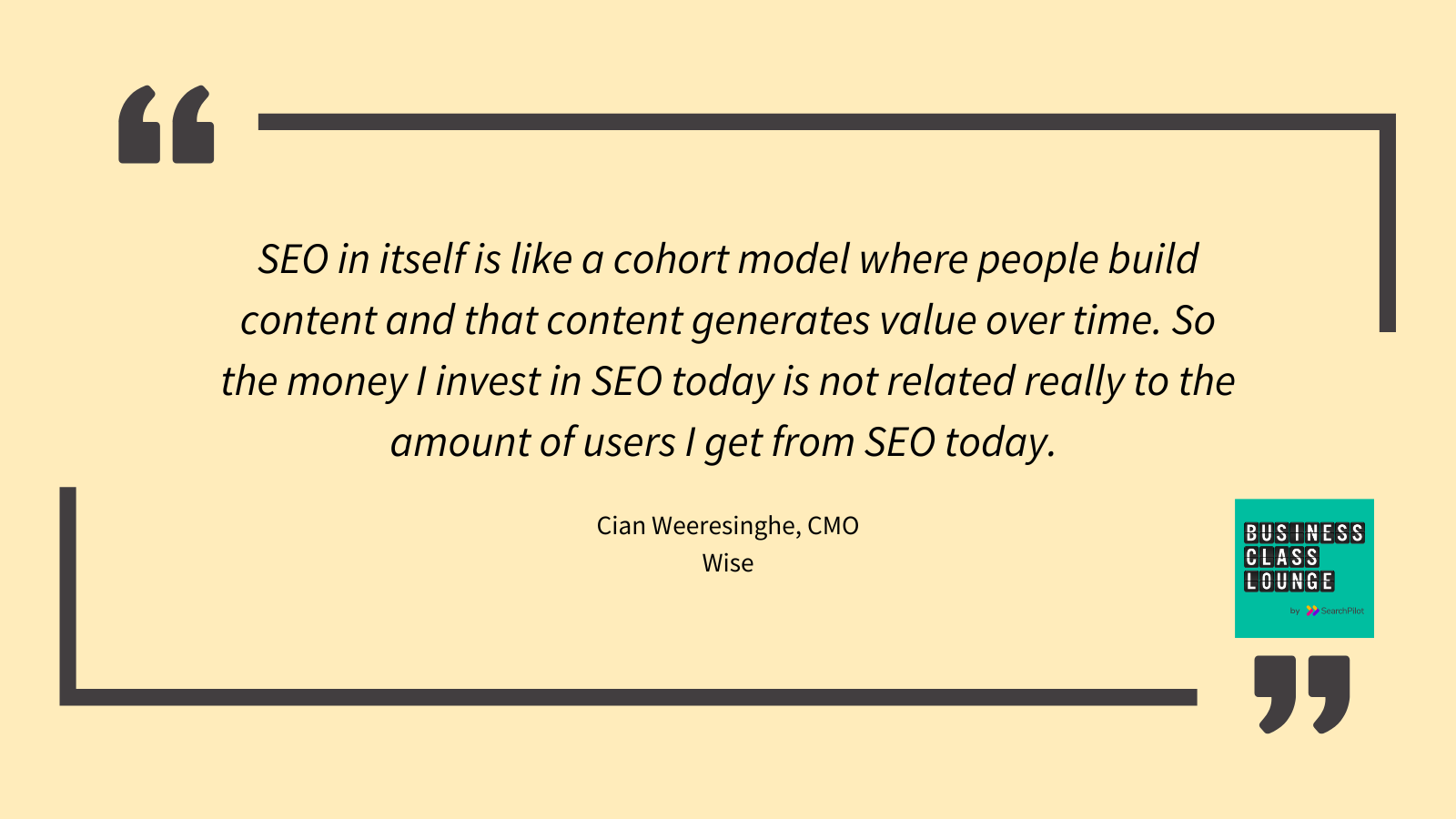
You mentioned you spend a lot of time thinking about budget mix. Do you start with a big pie and say I’ve got, “X million to spend, I’m going to divvy up across channels like this” or do you go more bottom up?
CW: Very much bottom up. The thing you probably need to be clear on is setting the parameters or rough context for how marketing wants to grow versus how the business grows. Because if marketing says we want to quadruple spend, but the business is only expected to grow less than quadruple, you have a little bit of a thought experiment to go through about why.
It’s not just the context of the shape of the curves of the different parts of the org, but also the economic parameters around their dollars. You should be optimizing to this level of ROI and this is why, or this is the payback number.
But then we go bottom up and that’s because the teams are much closer to how their channel scales and the elasticities.
And then there’s a beautiful theoretical piece of work, which we did at eBay, which Minal [ed: Saigal] led, which really was like, “average ROI is X, but there’s a bunch of stuff on the margin, which is ugly as hell. That’s all negative. And we probably should cut our marketing budget because there’s no real incremental growth with this extra spend”. It was a really powerful thing to work with someone who told finance we should cut marketing budget. And finance was like, “Okay, that’s pretty sensible.”
I don’t think we’ve got to that level of sophistication where I’m trying to make these last-dollar incremental tradeoffs between channels. But that’s the sort of thing we want to get to where channels feel they have an understanding of where their £10,000 or £100,000 are being spent and how effective it is. And for us to be able to somehow translate that and figure out if there is anywhere else we could put it. Because for us, if we can’t put it anywhere that’s effective, we want to give it back to the customers and reduce the price of the product. So that’s quite a good forcing function.
How do you think about when your team come to you asking for a really big budget number, maybe six or seven figures? Are you looking for some kind of credibility or ROI hurdle aside from the ‘sniff test’?
CW: Yeah, like you say, it depends on its magnitude and confidence. And confidence is through their ability to tell you what framework they are gonna put in place to tell you at the end whether it met the objectives. “These are the objectives. This is how we’re gonna measure it, and then this is how I’ll come back and tell you.” And they have to overlay some sort of confidence of “I’m pretty sure we’ll be in some sort of range and if I’m not sure, we should do a test that’s smaller.”
Huge Hail Marys like “we need 10 million quid to go and sponsor McLaren”; I struggle with that. So I would do the exercise I’d expect my team to do, which is to talk to lots of people, start writing some stuff down, and then where I have nervousness is to challenge myself, and then almost force fit this to some sort of set of numbers.
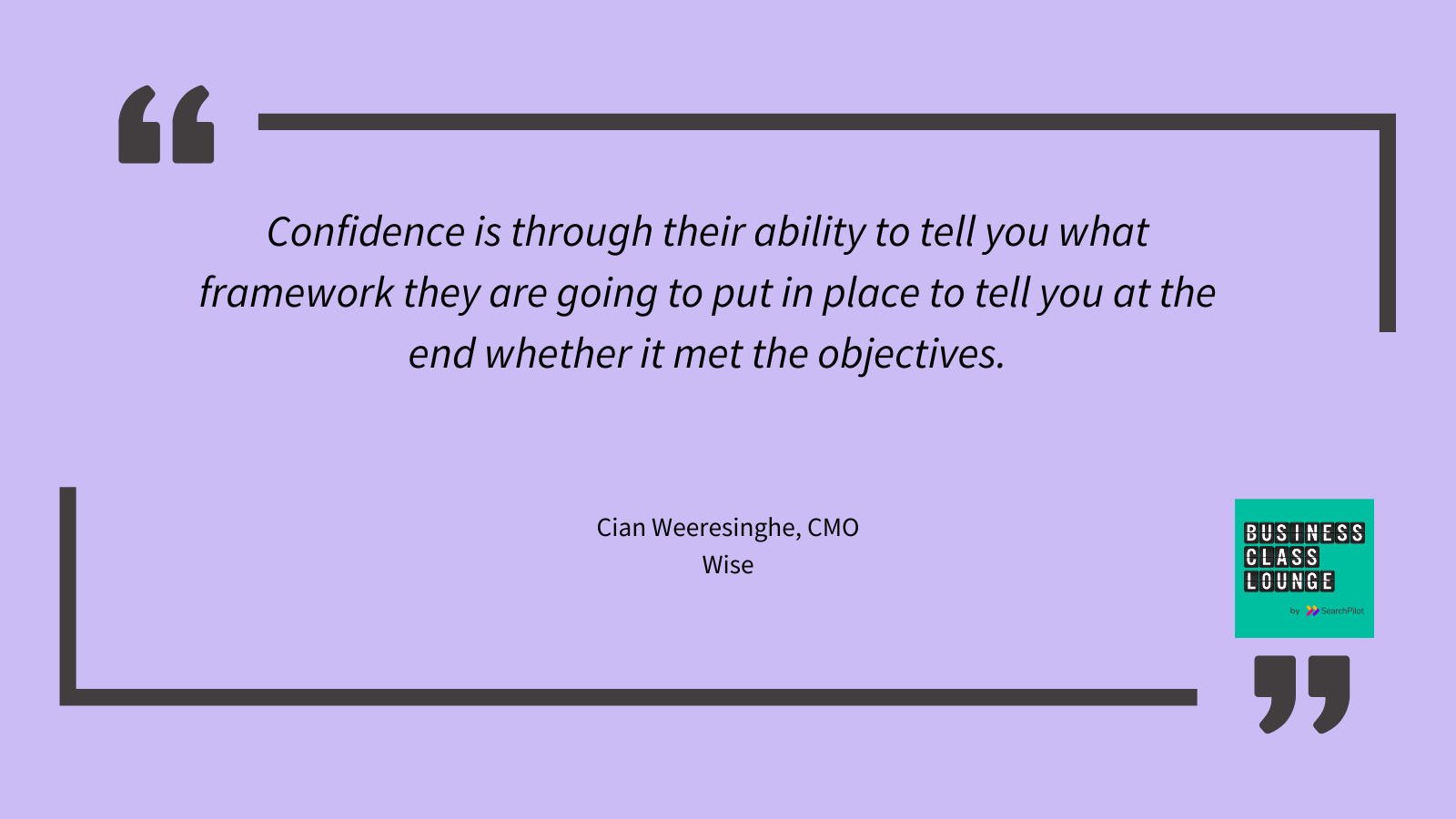
But you can’t tell me it failed because you have no idea how to assess whether it worked. Yeah, wrong kind of failure. It should be like “We measured all this stuff. With our confidence bounds, it was minus 50% ROI”. I’m like: “Cool, that’s fine. What did we learn? Let’s not do that again please.”
Do you have any tactical tips, like how do you think about getting started? If you’re a 20-something, just breaking in.
CW: You should be pretty aggressive at staying in touch with anyone you meet and definitely connect with them on LinkedIn.
I think you should not be afraid to just find people you think are inspiring in the industry and contact them for time if you’re very clear about how you want to spend time with them or ask people to leverage their network for you.
If you are quite clear about how you would pitch, that’s something like “I would love you to introduce me to three people who look like this, and I’m looking just for a five-minute coffee.” Because I think, again, there’s a bit of pay it forward that if you can help people at this stage through your network and they might work for you or you might work for them. So it’s all interconnected. I think just don’t be afraid to get people who are further in their career to do a bit of legwork with these coffees or do introductions. Just be very precise about what you want.
Further links
There are more great discussions like this, so head over to wherever you get your podcasts Apple, Spotify, Amazon, YouTube or you can catch the full episode directly from the feed here.
I’d love to hear your thoughts on this third episode, email me at podcast@searchpilot.com or send me a message on LinkedIn. You can also find Cian on LinkedIn and check out his work at Wise.
